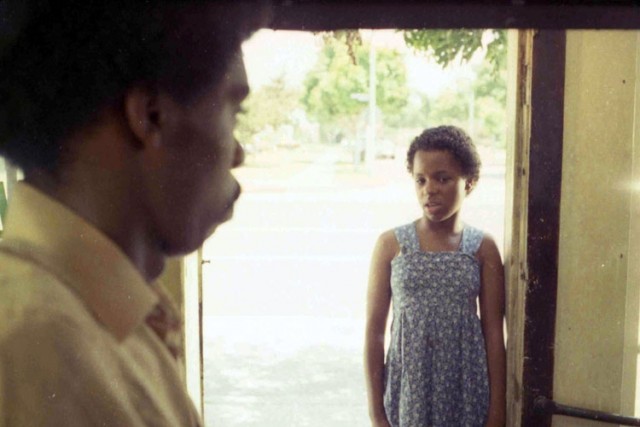
Charles Burnett’s MY BROTHER’S WEDDING is a poignant tale of a family struggling to survive in Watts
CHANGING THE PICTURE: MY BROTHER’S WEDDING (Charles Burnett, 1983/2007)
Museum of the Moving Image
35th Ave. at 36th St., Astoria
Saturday, February 23, free with museum admission, 6:00
718-777-6800
www.movingimage.us
www.milestonefilms.com
 Following the breakout success of the 2006 release of Charles Burnett’s remarkable Killer of Sheep (1977), the following year Milestone Films released a restored and digitally reedited version of Burnett’s poignant My Brother’s Wedding. Everett Silas stars as Pierce Mundy, a ne’er-do-well slacker who loafs around in his parents’ dry-cleaning store, waits for his best friend, the smooth-talking Soldier (Ronnie Bell), to get out of jail, and resents that his brother, Wendell (Dennis Kemper), has become a successful lawyer and is preparing to marry the snobby Sonia (Gaye Shannon-Burnett, the director’s real-life wife). As he did with Killer of Sheep, Burnett (To Sleep with Anger) sets the film in Watts, where poor black families struggle to make a go of it in the shadow of ritzy Los Angeles. Although Pierce never seems to make the right decision, his choices are limited, but that doesn’t stop Burnett from coming up with some very droll, funny scenes. Shot in color (Killer of Sheep was made in black-and-white), My Brother’s Wedding is another no-budget treasure from a vital director who is vastly underrecognized. My Brother’s Wedding is screening on February 23 as part of the Museum of the Moving Image series “Changing the Picture” and “L.A. Rebellion: Creating a New Black Cinema,” focusing on films that look at the real black experience in postwar America, and will be preceded by Robert Wheaton’s 1986 short, A Little Off Mark. The series concludes February 24 with Zeinabu irene Davis’s Compensation, preceded by Iverson White’s Dark Exodus, and Billy Woodberry’s Bless Their Little Hearts and The Pocketbook.
Following the breakout success of the 2006 release of Charles Burnett’s remarkable Killer of Sheep (1977), the following year Milestone Films released a restored and digitally reedited version of Burnett’s poignant My Brother’s Wedding. Everett Silas stars as Pierce Mundy, a ne’er-do-well slacker who loafs around in his parents’ dry-cleaning store, waits for his best friend, the smooth-talking Soldier (Ronnie Bell), to get out of jail, and resents that his brother, Wendell (Dennis Kemper), has become a successful lawyer and is preparing to marry the snobby Sonia (Gaye Shannon-Burnett, the director’s real-life wife). As he did with Killer of Sheep, Burnett (To Sleep with Anger) sets the film in Watts, where poor black families struggle to make a go of it in the shadow of ritzy Los Angeles. Although Pierce never seems to make the right decision, his choices are limited, but that doesn’t stop Burnett from coming up with some very droll, funny scenes. Shot in color (Killer of Sheep was made in black-and-white), My Brother’s Wedding is another no-budget treasure from a vital director who is vastly underrecognized. My Brother’s Wedding is screening on February 23 as part of the Museum of the Moving Image series “Changing the Picture” and “L.A. Rebellion: Creating a New Black Cinema,” focusing on films that look at the real black experience in postwar America, and will be preceded by Robert Wheaton’s 1986 short, A Little Off Mark. The series concludes February 24 with Zeinabu irene Davis’s Compensation, preceded by Iverson White’s Dark Exodus, and Billy Woodberry’s Bless Their Little Hearts and The Pocketbook.